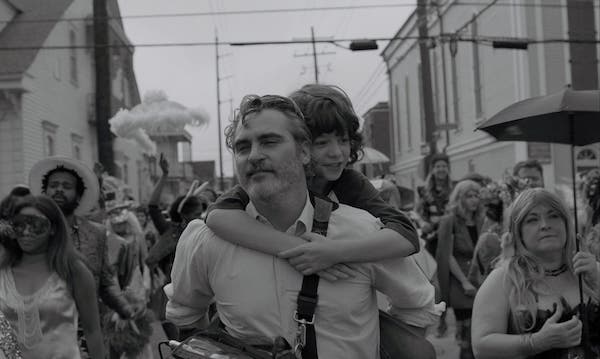Film Review: “C’mon c’mon” — Taking Care of Kids
By Erica Abeel
For a movie starring a kid, this one is adroitly crafted and goes easy on the treacle.
C’mon c’mon, directed by Mike Mills. Screening at Coolidge Corner Theatre and Kendall Square Cinema.

Joaquin Phoenix and Woody Norman in C’mon C’mon. Photo: A24
l’ve always shied away from movies starring kids. Good child actors are unnerving, they’re like homunculi — miniature adults who resemble the way medieval painters portrayed the Christ child. Kidcentric films also tend to go all treacly and meander into Mister Rogers’s ‘hood.
If you don’t share this super subjective bias, though, you should be up for C’mon c’mon, the new semi-autobiographical film from Mike Mills (Beginners, 20th Century Women), which made the lineup for this year’s New York Film Festival. It’s adroitly crafted and goes easy on the treacle. C’mon is surely a breakout vehicle for one Woody Norman, an 11-year-old British charmer, who wields a flawless American accent throughout the film and can weep — Mills has said on WNYC — on demand. The boy’s co-star is Joaquin Phoenix, an actor who in my view can scarcely put a foot wrong. In C’mon he does a 180 from his Oscar-grabbing turn as the Joker to channel a solitary mensch seemingly intent on keeping free of intimate ties.
Phoenix plays Johnny, a committed NPR-type radio reporter. He travels the country interviewing inner city teens about the issues concerning their generation and vision of the future. Johnny appears to spend a lot of time in hotel rooms where he subsists on takeout and avoids trimming his beard or hitting the gym.
A call from Viv, his sister on the West Coast (Gaby Hoffman, his equal in dishevelment), upends his tidy solitary world. Viv’s ex-husband, a musician, has gone mental and needs her help. Though Viv and Johnny have been semi-estranged, she asks Johnny to jump in and take care of Jesse (Woody Norman), her nine-year-old son. After moving into Johnny’s apartment in Chinatown, Jesse accompanies him on interviews, and before long they’re a team heading out to New Orleans. Wearing headphones too big for his head, Jesse learns to wield the audio (what happens with attending school goes unexplained). The journey of C’mon — you guessed it — is how a loner bonds with his nephew to emerge a more connected and evolved human being.
Mike Mills is a director known for pirating his own life for his films. Beginners features a dad who embraces life as a gay man following the death of his wife. 20th Century Women is a coming-of-ager about an adolescent raised by a feisty mother in the mold of the filmmaker’s own. C’mon delicately filters the director’s interactions with his own (apparently precocious) son through Phoenix and Norman.
The presumption that you can rivet an audience still reeling from a pandemic with a small black-and-white film about the minutiae and day-to-day challenges around childrearing is a gamble. To a great extent Mills brings it off, striking a variety of tones within its bounded spectrum. The chemistry and naturalness between Johnny and Jesse is remarkable to the point of eerie. Disarming moments — as when precocious Jesse casually mentions abortion — alternate with scary ones: the heart of any parent will lurch when Jesse is suddenly swallowed by a city crowd. At one point the boy confides to his uncle his recurrent fantasy that he’s an orphan; such specific details add to the aura of being drawn from life. The only place when the film goes Mister Rogers is when Viv counsels Johnny to tell Woody, “It’s okay to not be fine.” Phoenix is so watchable you root for him at every stage of the journey.
It’s also the director’s craft and artistic canniness that makes this film worthwhile — and, I suspect, won it a slot at the New York Film Fest. The choice to shoot in black and white feels just right, lending a documentary allure. Mills reels in the larger world through Johnny’s interviews, most of them poignant, with the inner city kids. At the same time Mills braids in a meta-text revealing Johnny’s thoughts through the device of his “radio diary” — a ploy that taps into the inner voices used in fiction.
What I liked best is the film’s fractured planes — Mills must have looked at a lot of Cezannes. The abrupt edits, stop-starts, overlaps, and truncated scenes capture the hectic pace of lives, their messiness, the impossible multiple demands placed on people such as Viv, with an ailing ex and a needy child. The title C’mon c’mon references the closing of Uncle Vanya. I’ll leave you to figure out how.
I’ve got a problem, though, with the sudden eruptions of sublime music on the film’s soundtrack. The Mozart Requiem? Please. (I know Viv’s ex- husband is a musician, but, well, c’mon). A filmmaker’s use of musical masterworks — not uncommon in indieworld — is often an unearned device to signal gravitas. Only Lars von Trier carried it off in Melancholia. When it comes to the Apocalypse, yes! pull out the stops and bring on the Requiem and Wagner!
A sobering note that carries C’mon into the current moment: the movie’s one flash of color appears in the end credits. It’s a title card dedicating the film to Devante Bryant, one of the children interviewed, who died in a shooting last year.
Erica Abeel is a novelist, film and cultural critic, and former professor at CUNY. Her 2016 novel Wild Girls, about three women rebels of the ’50s, was an Oprah Magazine pick. Her journalism has appeared in the New York Times, Indiewire, and other major sites and national publications. A former dancer, when not writing she’s in a Pilates class or at the barre. Her new novel, The Commune, was recently published by Adelaide Books.
